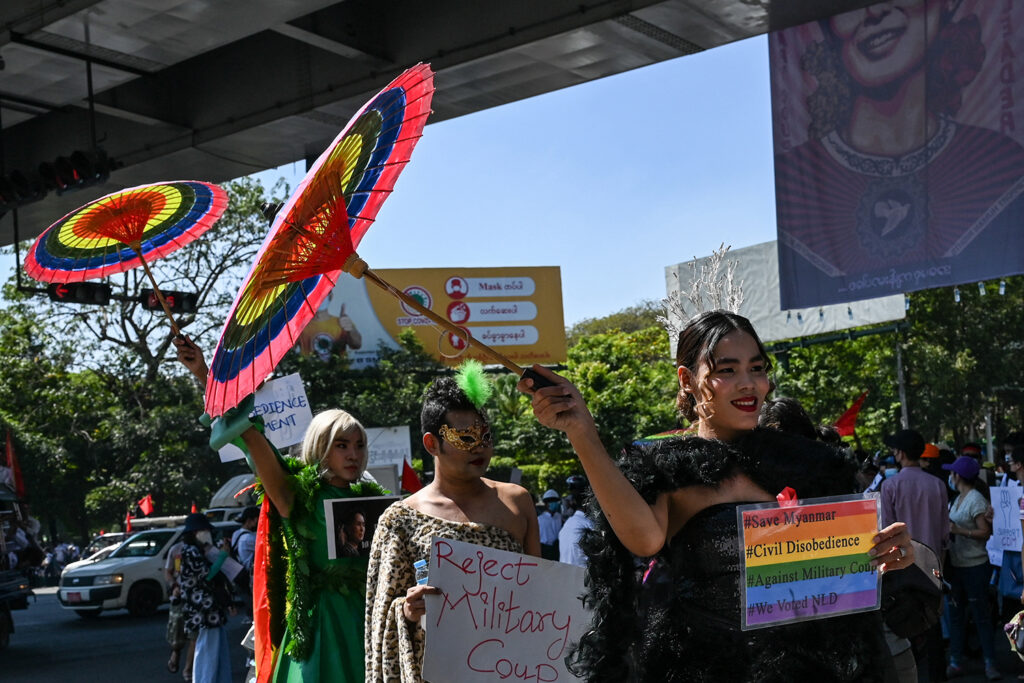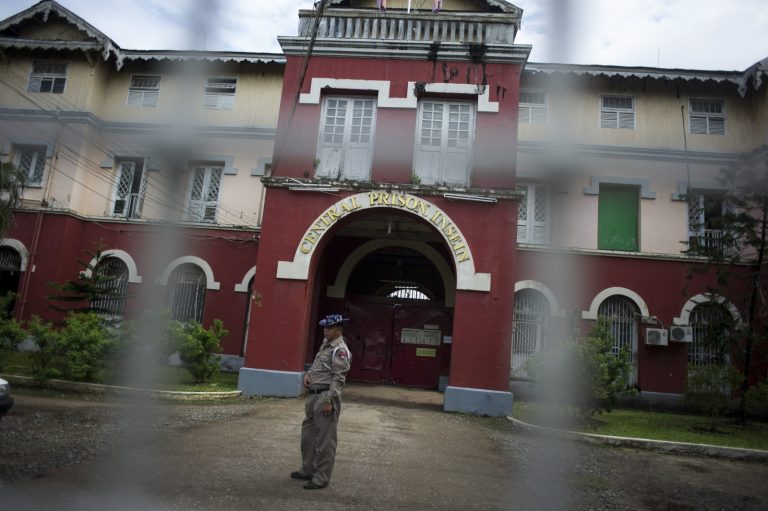Some LGBT activists are on the front lines of Myanmar’s revolution, fighting for democracy as well as societal acceptance, while facing brutal persecution from the military and even some mockery from their own comrades.
By FRONTIER
When transgender activist Ma Saw Han Nway Oo was arrested by the military regime in 2021, she was forced to remove her clothing to show whether she had undergone surgery.
“You are a man. Why would you dress up like a woman?” She recalled soldiers asking her, as she was brutally tortured at an infamous detention centre within the walls of Mandalay Palace.
This included having hot water poured on her, being slashed with a knife then doused with stinging sanitizer, having her feet struck with a rifle butt, and being beaten with a wire. Throughout the process, she was ordered to use male pronouns.
“I was forced to address myself as ‘kya naw’ even though I normally address myself as ‘kya ma’. They were making jokes and if I said ‘kya ma’ they would beat me more,” she said.
The day the Myanmar military seized power, Saw Han Nway Oo was planning to attend a workshop about the peace process with a focus on northern Shan State at Mandalay’s Seven Mile Beach.
“I distinctly remember the internet connection being abruptly severed around midnight,” she said. This was the beginning of her nightmare.
The road to Mandalay Prison
The 30-year-old transwoman had been an activist for years before the coup, taking a training course with the Assistance Association for Political Prisoners and holding lectures on politics and peace at the monastery where she taught.
“In the 2020 election, I stood with the general public and voted for the National League for Democracy,” she said. “I respect and admire Daw Aung San Suu Kyi.”
In November 2020, Aung San Suu Kyi led the NLD to a second consecutive landslide election victory, but was detained by the military on February 1, 2021, plunging the country into a political crisis.
Saw Han Nway Oo quickly joined mass protests in Mandalay, often marching with law students and lawyers or other LGBT activists. Though she lived in Mandalay at the time of the coup, she was born in Tachileik in Shan State and raised in Ayeyarwady Region before pursuing an English degree at Yangon’s Dagon University. She also received an online degree in criminal law with Malaysia’s Institute of Law during COVID-19.
In late April 2021, after a number of military massacres of unarmed protesters, Saw Han Nway Oo joined the youth exodus out of cities to territory controlled by ethnic armed groups, joining a two-month training programme with the Kachin Independence Army.
There, she said she faced some verbal harassment from KIA soldiers for being a transwoman, but her request to stay in the female barracks was granted, and she never suffered any physical abuse. She said the training was “challenging” but “rigorous and well-organised”.
After the programme was complete, she spent three days and two nights travelling through the forests of Kachin State, before arriving back in Mandalay. While she didn’t join the underground armed resistance in the city, she did continue financially supporting those fighting the regime.
Two months later, bad luck struck when a comrade was arrested in September. As in so many other cases, that arrest allowed the military to track down others in the network, and Saw Han Nway Oo was detained two days later at her apartment.
“When I arrived home, military trucks and police cars quickly flooded our street, blocking all access points,” she recalled. “Around 20 armed men approached me, pointing their guns directly at my face.”
“They kept interrogating me, repeatedly questioning if I had seen Saw Han Nway Oo, as if they had conjured up a different image of me.”
Saw Han Nway Oo said during her arrest she was hit in the head with a rifle butt, kicked in the chest twice, and “repeatedly slapped in the face”.
She was taken to a military detention centre in Mandalay Palace, where she was blindfolded and her body bound with tape. Then her torture began.
“I screamed so loud in pain but they didn’t mind,” she said.
“They continually hurled derogatory words at me,” she recalled. “They questioned my abilities and mocked me repeatedly, wondering how I could be of any use in military training.”
Other soldiers exposed themselves to her and even groped her.
After hours of torture, beatings and sexual assault, she lay battered in her jail cell, drifting in and out of consciousness. “I even wished for a swift death, longing for the pain to end.”

A societal problem
U Aung Myo Min, human rights minister for the parallel National Unity Government, appointed by elected lawmakers deposed in the coup, told Frontier that LGBT activists face extra persecution in the struggle for democracy.
“LGBT individuals were treated improperly and faced homophobia when they demanded democracy. In those instances, they were subjected to torture and further humiliation,” he said.
A gay man who has long been involved in advocacy, Aung Myo Min shares much in common with Saw Han Nway Oo.
After the 1988 pro-democracy protests were brutally crushed by the military, he joined the All Burma Students’ Democratic Front on the Thai border, an armed group committed to overthrowing the dictatorship.
“It was necessary for everyone to take part in the training,” regardless of gender or sexual orientation, he said. “My body was as strong as any adult man.”
He served for four years, and like Saw Han Nway Oo, sometimes faced verbal harassment from his own comrades.
“When I went out to the frontline of the battlefield, my comrades would always tease me and make jokes,” he said.
Ko Aung Kaung San*, an LGBT human rights activist in Yangon, told Frontier that discrimination is still common in Myanmar, including within the pro-democracy movement, but the situation had improved under the NLD.
He said during previous military-backed administrations, LGBT events were completely banned.
“Only during the five years under a democratic government, specifically the NLD government, were we able to host LGTB cinema festivals and shows,” he explained.
Still, Aung Kaung San also experienced discrimination from other pro-democracy supporters, including during anti-coup protests in February 2021.
“As we marched through the streets with the rainbow flag held high, I overheard somebody asking their companions why we were there. They referred to us as ‘a chout’ [the Burmese word for gay] and mocked our ability to make a difference,” he said.
Part of this societal discrimination, Aung Kaung San said, is rooted in Buddhism, the predominant religion in Myanmar.
“If you identify as a gay man or transgender, you will be told that straight men hold a superior position,” he said, claiming LGBT people are blocked from ascending to the holier uppermost parts of temples and pagodas. “Negative comments will be made about you, and they will try to convince you to revert to identifying as a straight man.”
Escape from Myanmar
After one night in Mandalay Palace, Saw Han Nway Oo was transferred to a police station in Aung Myay Thar Zan Township, where she was charged with incitement under section 505A. But this wasn’t the end of her nightmare.
Here she had her fingernails squeezed with pliers, was beaten with wire cables and had scalding water poured on her when she dared to ask for something to drink.
“The cell I was placed in was even smaller, measuring approximately 4×5 feet. It was so cramped that I couldn’t even bend or curl up comfortably. I felt dehumanised, as if I were an animal trapped in a cage. Two weeks later, I was transferred to Obo Prison to continue my trial there,” she explained.
She was then provided food twice a day in a small plastic bag, consisting of rice and a meal prepared by the wife of the police chief. But the physical and verbal abuse continued.
“They repeatedly echoed the same words that the soldiers had used in prison, making irrelevant references to my identity and military training,” she said.
In Obo, she was registered as a male inmate, forced to wear male prison garb and interned in the male dormitory.
“I was forced to sleep alongside men in the same cells and bathe and change clothes in front of them. It was an incredibly unsettling experience, filled with a constant sense of insecurity,” she explained.
“Thanks to my cellmates, who treated me very kindly, I found some relief. However, on one occasion, one prison guard took me away from the range of the CCTV cameras and exposed his private part to me. It was disgusting,” she shared with Frontier.
She was released in a mass amnesty on November 18.
“I was happy and sad because although I was freed, some of my cellmates were left behind,” she said with a heavy heart.
After her release, Saw Han Nway Oo decided to stay in Mandalay for a few days, but she did not go back home because her family was also under surveillance by the military. Then she left for Lay Kay Kaw in Kayin State on November 23, which at the time was under the control of the Karen National Union, an ethnic armed group allied with the pro-democracy uprising. But the town fell to the military around a month later, and she joined other refugees fleeing to Thailand.
Aung Myo Min praised LGTB activists who have continued to fight for democracy, despite the steep risks they face.
“Even though they know they could face such humiliation, they still participated in Myanmar’s Spring Revolution. I will always admire and respect these rainbow heroes,” he said.
While Aung Kaung San was critical of discrimination in Myanmar society in general, he said the problem is far worse within the military.
“If we are detained alongside others, our identity will become a reason for receiving worse treatment,” he said. “Our only fault is that we are different. Addressing this issue in our country, where long-standing traditions are deeply ingrained, will require more significant progress.”
Aung Myo Min said this is a key part of the current uprising.
“The Spring Revolution has shown that it’s not only a revolution against dictatorship but also a revolution for recognition and mutual understanding among different parts of our society. This is what the rest of the world should know and understand,” he said.
Despite the horrors she’s faced, Saw Han Nway Oo remains committed to doing her part for this movement.
“I will not give up on this journey, and I will continue to fight for the revolution,” she said.
*indicates a pseudonym for security reasons







